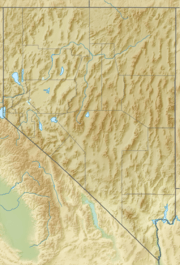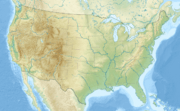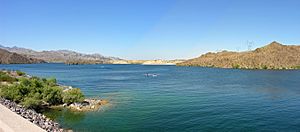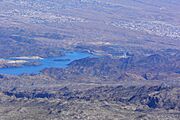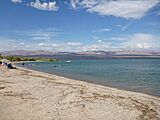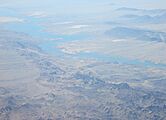Lake Mohave facts for kids
Quick facts for kids Lake Mohave |
|
|---|---|
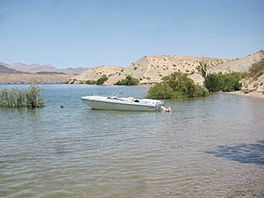
Lake Mohave across from Cottonwood Cove
|
|
| Location | Mohave County, Arizona / Clark County, Nevada, US |
| Coordinates | 35°26′14″N 114°38′37″W / 35.43722°N 114.64361°W |
| Type | reservoir |
| Basin countries | United States |
| Managing agency | National Park Service |
| Surface area | 26,500 acres (10,700 ha) |
| Average depth | 75 ft (23 m) |
| Water volume | 246.1 million cubic metres (199,500 acre⋅ft) |
| Surface elevation | 647 ft (197 m) |
Lake Mohave is a large reservoir located on the Colorado River. It sits between two big dams, the Hoover Dam and the Davis Dam. This lake forms part of the border between Nevada and Arizona in the United States.
The lake stretches for about 67 miles (108 km) and passes by several towns. These include Boulder City and Laughlin in Nevada, and Bullhead City in Arizona. Lake Mohave can be up to 4 miles (6.4 km) wide and is about 647 feet (197 m) above sea level. It covers a huge area of 28,260 acres (114.4 km2) of water. Lake Mohave is part of the Lake Mead National Recreation Area. This special area is managed by the U.S. National Park Service, which helps protect its natural beauty.
Contents
Fun Things to Do at Lake Mohave
Lake Mohave is a fantastic place for outdoor adventures all year round! The water stays warm enough for swimming, even when it's cooler outside. Its clear waters are perfect for many activities.
There are three main resorts on the lake where you can stay and find supplies. These are Katherine Landing and Willow Beach in Arizona, and Cottonwood Cove in Nevada. These resorts often have places to stay, spots for RVs, campgrounds, restaurants, and stores. You can also find boat ramps and marinas to launch your boat.
Popular activities include swimming, kayaking, fishing, and boating. You can rent boats and other watercraft nearby. The towns of Bullhead City, Arizona, and Laughlin, Nevada, are close by. They offer many places to eat, shop, and stay for visitors.
The desert around Lake Mohave is also great for exploring. You can go hiking, take amazing photos of wildlife, or just enjoy the views. Many desert plants and animals live here, specially adapted to the hot, dry climate. There are hiking trails for all skill levels. The shoreline of Lake Mohave is even a special path called the Mohave National Water Trail.
Diving into Lake Mohave's Waters
The Lake Mead National Recreation Area, which includes Lake Mohave, is a great spot for scuba diving. Both beginners and experienced divers can find exciting places to explore.
At Lake Mohave, divers often visit Black Canyon. The water here is usually very clear, making for excellent diving. For more experienced divers, Ringbolt Rapids offers a challenge with its fast-moving water. There are also interesting underwater sights like the Work Barge, a tow barge that sank in 1946. At Cabinsite Point, you can even see two sunken boats!
Enjoying Personal Watercraft
Personal watercraft (like jet skis) are a fun way to explore Lake Mohave. To help keep the lake clean, there are rules about which types of watercraft can be used. Generally, newer models with cleaner-burning engines are allowed. This helps protect the environment and the lake's beautiful clear water for everyone to enjoy.
Exploring Hot Springs
The area around Lake Mohave has a volcanic past, which means there are several natural hot springs! These warm pools are found along the northern part of the lake.
One popular spot is Gold Strike Hot Springs. You can reach it by hiking a short distance from a trailhead near the Hoover Dam. These springs are often visited because they are easy to get to and have consistent warm pools. Other springs, like Two Mile Hot Springs and Arizona Hot Springs, are also nearby. They offer a more private experience for those who want to explore further.
Amazing Fish of Lake Mohave
Lake Mohave is home to many different kinds of fish. Some are native, meaning they have always lived here, while others were introduced by people.
Native Fish You Can Find
- Bonytail chub: This fish is considered endangered, meaning it's very rare.
- Razorback sucker: This fish is also endangered and special efforts are made to protect it.
Fish That Were Introduced
Many other fish have been introduced to Lake Mohave, making it a popular spot for fishing.
- Bluegill
- Channel catfish
- Common carp
- Crappie
- Green sunfish
- Largemouth bass
- Rainbow trout
- Smallmouth bass
- Striped bass
- Threadfin shad
- Yellow bullhead catfish
Helping Fish Thrive
People are working hard to help the fish in Lake Mohave. One program helps the sport fish that were introduced to the lake. They place special bundles of artificial habitat in coves. These habitats are made from bundled salt cedar trees attached to wooden pallets. When placed in the water, they create safe hiding spots for fish.
There's also a big effort to protect the endangered razorback sucker. Each spring, a team of fish biologists collects about 30,000 razorback sucker larvae (baby fish) from the lake. They use underwater lights to gather them. These tiny fish would otherwise be eaten by other fish. The larvae are then taken to the Willow Beach National Fish Hatchery. Here, they grow safely for up to three years. Once they are about 14 inches long, they are released back into Lake Mohave. This helps them avoid being eaten by larger fish like striped bass.
Gallery
See also
- Katherine's Landing, Lake Mohave
- Cottonwood Basin (Lake Mohave)
 | John T. Biggers |
 | Thomas Blackshear |
 | Mark Bradford |
 | Beverly Buchanan |


